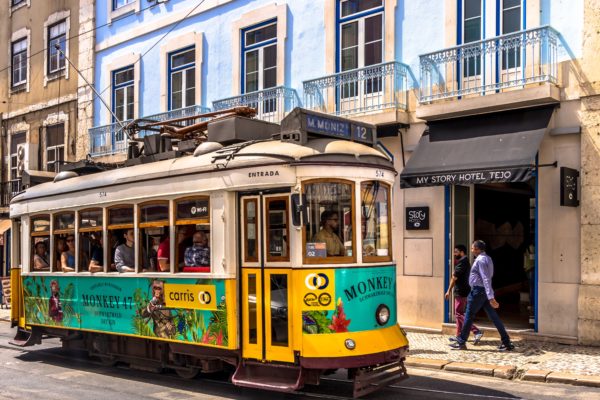Why Lisbon is so popular as a remote work destination
The 2022 FIPP World Media Congress is fast approaching, and as we leave behind the lockdown nightmare of the last two years, we’ve decided to do something a bit different this time around and stage the event in the historic coastal town of Cascais, which is just a short train ride away from the centre of Lisbon.
Having just been named the best country in the world to be a remote worker by the travel research website Momondo, Portugal is a country that has consciously capitalised on the trend towards location-independent ways of working, especially in its capital city of Lisbon and the surrounding area.
To that end, we thought we would take this opportunity to take a look at why the region has become so popular amongst remote workers, and what Congress attendees can expect to find from the picturesque – and importantly at this point in time – real-world surroundings of the area.

Momondo’s Travel and Work Index ranks 111 countries on 22 criteria, divided into six categories such as health and safety, climate and social opportunities. Portugal ranked highly in all categories. Explaining its decision, the Momondo website cites the existence of Portugal’s remote work visa, the high level of English spoken by many inhabitants, as well as “its high political stability with no violence, great weather and low air pollution”.
Perched on the hills between the Tagus River and the ocean, full of the kind of charm found in a Wes Anderson film, Lisbon feels like a place that is only growing in stature. It’s one of Europe’s sunniest and friendliest capitals, and the only one flanked by sandy Atlantic beaches, so there’s year-round reason to spend time outdoors – whether sipping coffee at a quiosque (kiosk) or hiking along the coast to nearby Cascais or Sintra.
For all this natural capital, Portugal is still western Europe’s poorest country – and the Portuguese government has been very deliberate in its strategy to promote the country to tech entrepreneurs, startup founders and digital nomads, who bring money and entrepreneurial spirit with them. So how does it do it, and what are the implications?
Hosting big ticket events
Perhaps the most well-known of Portugal’s big-name events with international appeal is Web Summit. Being Europe’s biggest tech event, it attracted more than 70,000 attendees in 2019 and 42,000 in 2021 (smaller due to ongoing pandemic restrictions), having grown exponentially from its original starting point with just 400 attendees in Dublin in 2009. The conference relocated to Lisbon in 2016, citing a need for better infrastructure to support its expansion, and in 2018 made a binding agreement to stay in the city for at least the next decade.
“Staying here for another 10 years brings us so much certainty,” Web Summit founder Paddy Cosgrave told journalists at a press conference at the time. “My heart and the team’s heart is in Lisbon.”
This is a major boost to the Portuguese government’s wider aspirations for the city to become a tech hub. Although the government actually pays Web Summit €11m annually to keep expanding the venue, it’s well worth it: the week that Web Summit takes place brings in an estimated €300m (USD $347 million) for Lisbon in hotel and other revenue, according to Reuters.
My heart and the team’s heart is in Lisbon.
Paddy Cosgrave, Founder of Web Summit
Attracting the world’s remote workforce
Alongside hosting large international conferences, Portugal also makes itself an appealing place for individuals to become tax resident. As a country with a relatively low minimum wage (EUR €705 per month) and a high rate of emigration, especially among young people, Portugal has long recognised the benefits of attracting skilled immigrants. Like many other European countries it also has an ageing population, and therefore a need for younger workers to expand its tax base.
In the absence of high local wages, attracting those receiving higher salaries from abroad to live and work in Portugal, even short term, seems like a good strategy. Non-EU citizens (which now include those from the UK) are able to get a “golden visa” by making an investment of €500m, usually in property – although this has recently been suspended in Lisbon and Porto to prevent too much property being sold off for this purpose.
Meanwhile, tech entrepreneurs can get a startup visa, and skilled foreign residents including medics, musicians, artists, writers, software developers and engineers can get a generous income tax rate, a flat 20 per cent for the first 10 years they live here.
In part due to these offerings, the number of foreigners residing in Portugal totalled 590,348 in 2019, the highest figure recorded by the Foreigners and Borders Service since its emergence in 1976. And many of these can be classified as location-independent workers.
With more and more people seeming to recognise Portugal as an attractive destination not only to visit but to live, what does the government make of this?
“I’m very optimistic about this trend,” said Rita Marques, State Secretary for Tourism in the Portuguese government, on stage at Web Summit in 2021. “I hope we’ll be happier, have better jobs, and make good alliances with companies. My mandate has changed as a result of remote work – we have been claiming that Portugal is a nice place to visit, but it is not only this: it’s a nice place to live too!
“We have a huge market of second home residents, so it’s good for investing already. What we’re trying to do now is to foster tourism all year round. The pandemic has been a good opportunity for us to show what a nice place Portugal is to be.”
I believe everything that opens journalists to the world they live in is a good thing.
Catarina Carvalho, Editor, Mensagem de Lisboa
Implications for media brands
Yet while the overall environment in Lisbon is innovative and exciting, the implications for media brands are limited, in the opinion of Catarina Carvalho – FIPP Congress speaker, Editor at Mensagem de Lisboa, a digital newspaper which has received support from both the Google News Initiative Growth Programme and the Facebook Accelerator Programme, and former Executive Editor in Chief of Portugal’s oldest newspaper, Diario De Noticias.
“It has brought in some people, namely journalists, but the two communities [media brands and individual journalists] don’t communicate a lot,” she told me. Further, she hasn’t heard much about media companies choosing to move to Lisbon as a result of government initiatives or changes in working habits.
This is because “The Portuguese media environment is very closed in a bubble”, Carvalho said, although some new ventures – namely Atlas Lisboa and People of Lisbon – have sprung up in recent years. Mensagem de Lisboa is also starting a new project to address the needs of the expat community, such as hosting an online Q&A in English about the Portuguese election held last month.
That isn’t to say that things couldn’t change in the future, though, as an influx of talent from abroad brings new ideas into the country.
Lisbon remains an obvious choice
Even if much of the world’s workforce does go back to the office, hybrid arrangements will likely stay in place at a significant percentage of companies, giving employees the chance to spend longer periods in different countries while working from there. Lisbon seems set only to get even more popular, as word of its friendliness towards this way of life gets around.
Startup Lisboa is an incubator service for both foreign and Portuguese startups (50:50 ratio), with 93 startups on their books, including several media-related startups. Later this year, the company will open up a 35,000m² space – formerly an abandoned military facility – exclusively for startups, which are either based in Lisbon already, or want to be.
“We don’t have to do much convincing, to be honest,” André Costa, Head of Strategy at Startup Lisboa, told me when I visited their office in downtown Lisbon recently. “People come here to Lisbon and they generally want to stay when they see it for themselves and all it has to offer.”
This is evident in daily life. As opposed to many other capital cities, Lisbon cafés offer good WiFi and are laptop-friendly; they often stay open late and serve good coffee. Strolling around the city, you get a strong sense of the easy alliance between work and leisure: watching people take Zoom calls on a sunny terrace, for example, or tap away on their laptops while drinking a beer in the late afternoon. Sitting in a café in a popular central district like Bairro Alto, you’ll hear not only a lot of English but Spanish, French, German, Dutch and Brazilian Portuguese.
As well as regular cafés there are countless coworking spaces which have popped up to meet the demand of the software developers, freelance writers and tech entrepreneurs who flock here.
Catarina Carvalho told me that, indeed, programmes like the golden visa and the attractive tax rate aren’t necessarily the main reason people move here. Rather, “It’s because of the weather and the calm and the beauty of the city. [So] in terms of individual digital nomads the interest is, I think, more cultural than economic. This helps bring other ideas and a new way of life to Lisboa, which is always a very open city. It’s great, in my opinion.”
There is a cost to all this, though. Carvalho warns that local people are being priced out of the city due to wage disparities, a topic high on voters’ priority lists ahead of the Portuguese general election, which took place on 30 January. “The investment to local neighbourhoods is also a [good] thing, but it has its drawbacks: like making the housing prices go up to the point when it’s impossible for the young people in Lisbon to have a house in town. This is due to disparities in the European and the Portuguese prices,” explained Carvalho.
On the implications of the remote working trend at large, and in particular on the media industry, though, Carvalho is positive: “I think in general it is a nice way of making the world go round. It is also something that brings the world to the media newsrooms and we should make the most of it. I believe everything that opens journalists to the world they live in is a good thing!”











